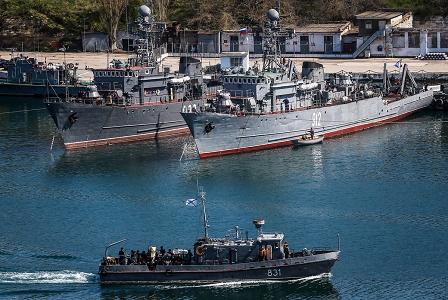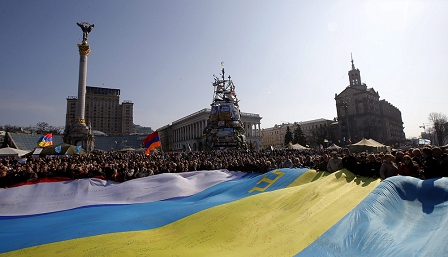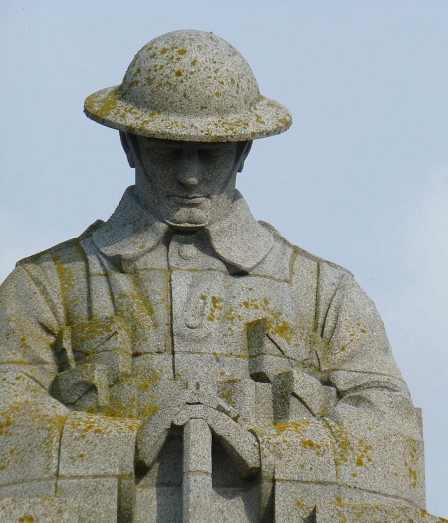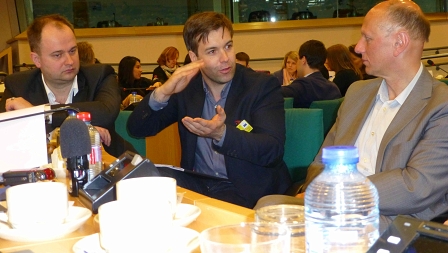Erstellt am: 28. 3. 2014 - 15:25 Uhr
"Putin Probed With A Bayonet And Found Mush"
"From this day on, the EU flag is legitimized by blood and valor. From this day on, it lives", wrote the Eastern European think-tank Expert Forum on February 19th in the immediate aftermath of the killings on the Maidan.
But if it is true that the anti-Yanukovich protesters shot by snipers on the streets of Kiev died with European flags in their hands, many surviving pro-EU Ukrainians will have been disappointed to hear a rather noncommittal former European Union Parliament President Jerzy Busek speaking here in Brussels.
"Solidarity is the essence of humanity", he announced grandly before qualifying that noble sentiment with the assertion that the EU shouldn’t take any action that would hurt the pockets of its business community too severely.
Better than extending sanctions, he suggested, would be to warn investors that "to invest in Russia is as risky as in Bangladesh, Chad or Nigeria". The Russian economic crisis on the late 90s, he said, had cost European countries 70 billion dollars. That should be a historical wake-up call.

APA/EPA/SERGEI ILNITSKY
But what about a security wake-up call? Or even a moral wake-up call? In a vote yesterday, the UN Assembly declared that the Crimea referendum "has no validity" and called on UN countries "to refrain from any action or dealing that might be interpreted as recognizing any such altered status." And yet for much of Europe it is simply business as usual with Russia.
Listening to Buzek’s speech the Irish historian Brendan Simms was unimpressed with the investment comparison. Neither Chad, Bangladesh nor Nigeria, he pointed out, had annexed the territory of a sovereign nation. Was Buzek ignoring the enormity of the implications of what has just happened in Europe?
Indeed, here in Brussels I spoke to journalists and analysts from the across the 28-nation bloc, including from countries that share a border with Russia. None of them, unsurprisingly, had wanted a military response from the EU. But most had hoped that the European Union would answer Russia's move into Crimea with a strong, unified and determined voice - a voice that would show that the world's largest economy is also a force to be reckoned with. That hasn't happened.
Europe always "muddles through" said Hendrik Vos from the University of Ghent, referring to last-hour consensus decisions that, despite the often grim prognosis, had taken the sting out of the economic crisis. But Vos was talking about economic policy. In terms of foreign policy and security policy, is muddling through enough?
"An Act of Brute Force"
In a speech in Brussels, US President Barack Obama was more forthright. He described Russia’s annexation of Crimea as "an act of brute force". But it seems the European Union response will consist of limited sanctions, an aid package for Kiev and a warning to the European business community to be a little bit cautious when investing in Russia.

APA/EPA/ROBERT GHEMENT
Business As Usual?
Meanwhile EU member France is proceeding with plans to sell a battleship to Russia this year, test-sailing the ship at the height of the crisis.
Germany too has great business interest in Russia, seems to trump interest in matters of sovereignty. During a trip to Moscow this week the CEO of German giant Siemens met Vladimir Putin at his residency and announced his firm did not pay too much attention to "short-term turbulences" in its business planning.
"Short term turbulences?"
So it seems it is business as usual for European Union nations in their dealings with Russia and, on one level, it’s easy to understand the timidity of their response.
Oil as "the New Red Army"?
First and foremost of course, nobody wants to commemorate the centenary of World War One by triggering World War Three. We should perhaps prize caution rather than sabre-rattling. During his Brussels speech Obama was quick to assert that Putin couldn’t be ejected from Crimea, which was Russian territory until the 1950s, by force. As Obama learned to his cost in Syria, if you talk about red-lines you have to be truly ready to act when they are crossed.

chris cummins
And secondly Europe’s economy is deeply entwined with that of Russia. Economic sanctions and the inevitable Russian response will impact EU nations much more severely than they will impact the USA. As Buzek pointed out, the Russian oil and gas supplies that power much of Europe have been described by some analysts "the New Red Army". By allowing themselves to become so dependent on the imports, Europeans have forfeited much of their diplomatic power.
Forfeited Power?
But it is equally easy to understand why this policy is dangerous. Brendan Simms, the author of Europe: The Struggle for Supremacy, an insightful look at power politics on our continent, says that Putin was never afraid that the European powers might meet his military incursion with any force.
"I’m sure he would never have thought about doing such a thing if the European Union were a single political entity with a united military. He simply wouldn’t have dared."
Mush not Steel?
All of that is highly theoretical. Even if the will was there for greater political union, which it is not, such a union would be years away. But even in its present somewhat wishy-washy form, Simms says, the EU let Ukraine down by not enforcing the full range of economic sanctions available and maintaining them until Putin rescinds his decision to annex Crimean. "Putin has probed with a bayonet and found mush," Simms said, adapting a Lenin quote about testing his opponent’s weakness.
Simms blames what he sees as a soft response on Germany’s dominating role at the heart of Europe. "Germany is surrounded by a buffer of friendly non-aggressive countries and doesn’t see Russia as a major threat."
So the Ukraine crisis has been a sobering period for the EU as a strong voice on the world stage. We were offended when the assistant US secretary of state, Victoria Nuland said "Fuck the EU" when talking to the US ambassador to Ukraine. But the implication, that Brussels didn’t have a strong role to play, might have been proved more true than we would like to think. Who should be more embarrassed by the foul-mouthed slip - the US for being rude or the European politicians who invited such distain?

chris cummins
Yet in some ways, suggests Daniel Olin, a journalist from Finland, the Ukraine crisis could prove to be an opportunity for the EU. He suggests it has brought the European Union closer together. For years many Europeans viewed the Union solely through an economic prism. Did it make us richer or poorer? Suddenly, with security threated, many Europeans are beginning to see it more as a political and security entity too.
Indeed, says Polish journalist Katarzyna Nocu, in Warsaw the ruling Civic Platform party has begun to talk about stronger institutions to make Poland feel more secure within the European community. In Poland there has been increased debate about whether the European Union should have an army and solutions to Poland’s dependence on Russian oil and gas.
Andres Kuusk, a journalist with Estonian television, says that the crisis in Ukraine has focussed the minds of Estonians. His Baltic country shares a border with Russia and has a sizeable minority of often disgruntled Russian speakers within its population. He says the situation is not comparable with that of Crimea, but that the security issues have been thrust to the top of the agenda ahead of May’s European elections.
"Everyone wants to see a clear message." He says, "We understand that it is very difficult to make real steps. We don’t want to see the world just watch on and pretend it is business as usual."


